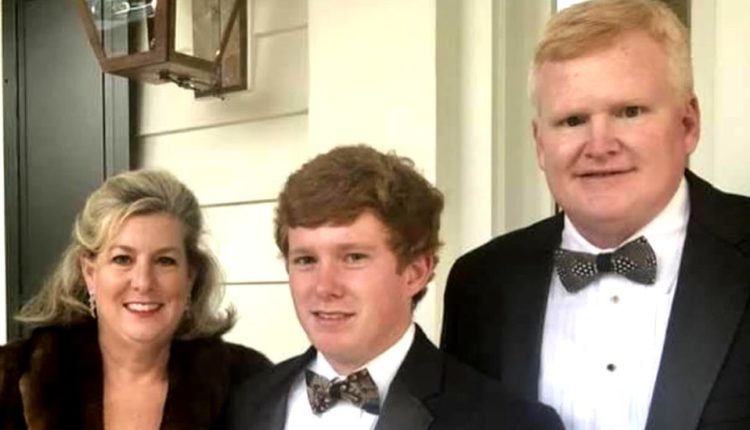For generations, the Murdaugh family dominated their rural swath of South Carolina – then Alex Murdaugh was accused of the brutal murders of his wife and son. What followed was the stunning unravelling of a life of power and privilege, exposing embezzlement, drug abuse and a failed hitman suicide plot.
You may find some language offensive.
In the fifth week of his murder trial, Alex Murdaugh took the stand.
Over nearly 10 hours testifying in his own defence, the crowded courtroom in Walterboro, South Carolina, would see two versions of Mr Murdaugh. One seemed tired, his voice lilting and thin. His clothes hung loose; months in prison had whittled down his formerly heavy frame. He rocked back and forth, shook his head from side to side, and wept.
The other seemed much more like the man that other witnesses had described – savvy and charming, once a formidable player in the state’s clubby legal circuit. This Mr Murdaugh addressed the jury directly, was relaxed and in control.
“What a tangled web we weave,” he told them.
Directly ahead of him, on the rear wall of the courtroom, there was a rectangular-shaped sun stain where a painting used to be – a portrait of his namesake, his great-grandfather Rudolph “Buster” Murdaugh, which had been taken down for the trial.
For nearly a century, the Murdaugh family reigned in this southern corner of South Carolina – a flat expanse of marshlands, palm trees and porch-ringed houses – presiding over the local prosecutor’s office and the private law firm that made them rich.
But since the brutal killings of his wife, Maggie, and son, Paul, in June 2021, a series of bizarre and tragic events helped bring about Mr Murdaugh’s spectacular fall from grace. The 54-year-old has denied the murders, which prosecutors allege were a desperate diversion from decades of financial wrongdoing. But on the stand, he admitted to a number of other crimes, including embezzlement, fraud and a faked assassination attempt.
The trial has become one of the most closely watched in the country. It has exposed what some see as the apparently unchecked power of the Murdaugh family in their small community, and brought about the undoing of a local dynasty.
“This is what happens when average people have no checks and balances,” said Bill Nettles, former US attorney for South Carolina.
“And there were no checks and balances on him.”
To know South Carolina’s Lowcountry is to know the Murdaugh family name. Between 1920 and 2006, three generations of Murdaugh men presided as the chief prosecutor for the state’s Fourteenth Judicial Circuit, the longest such stretch of family control in United States history.
“They were the law,” Mr Nettles said.
For even longer, the Murdaughs worked at the family-founded litigation firm – Peters, Murdaugh, Parker, Eltzroth & Detrick (PMPED) – amassing a small fortune and building out their dominance in all corners of the Lowcountry. By all accounts, in a region where personal injury firms thrived, theirs was the best.
“They could get a verdict that would exceed the norm dramatically,” said South Carolina lawyer Joe McCulloch.
“And when I say exceed the norm – they could turn a $100,000 case into a million dollar settlement.”
Their judicial circuit became known as a mecca for plaintiffs. Corporations who could avoid it reportedly skipped the area entirely.
To juries, locals said, the Murdaughs were familiar faces – a reliable advantage at trial.
“When people graduated high school, they would send gifts; they paid for funerals, sent flowers to people who were in the hospital,” said Eric Bland, a malpractice attorney based in South Carolina. “They salted the town with goodwill.”
From their two offices in Hampton, the Murdaughs established themselves as a de facto authority of the Lowcountry. Their influence was not wide – it did not even span the width of the state – but it was deep. In the small, insular community where they lived, residents said, the Murdaugh family ruled.
“We all knew them,” said one waitress in town, who also didn’t want to give her name, saying she didn’t want to “get in trouble” for speaking out of turn. She also didn’t want to be recorded. “You’re just going to have to remember this,” she said. “They had power. And they took it too far.”
Source: BBC


Comments are closed.